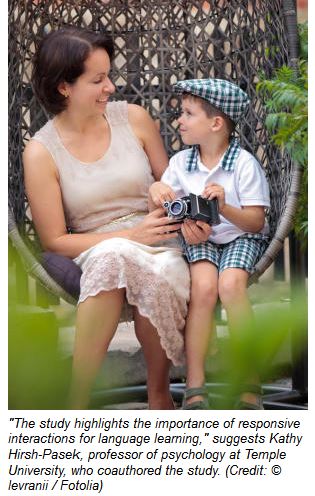Responsive Interactions Key to Toddlers' Ability to Learn Language
[Source: Science Daily]
 Young children readily learn words from their parents, grandparents, and child care providers in live conversations, but learning from video has proven more difficult. A new study questioned why and found that it’s the responsiveness of the interactions that’s key: When we respond to children in timely and meaningful ways, they learn — even when that response comes from a screen.
Young children readily learn words from their parents, grandparents, and child care providers in live conversations, but learning from video has proven more difficult. A new study questioned why and found that it’s the responsiveness of the interactions that’s key: When we respond to children in timely and meaningful ways, they learn — even when that response comes from a screen.
The study, by researchers at the University of Washington, Temple University, and the University of Delaware, appears in the journal Child Development.
Three dozen 2-year-olds were randomly assigned to learn new verbs in one of three ways: training with a live person, training through video chat technology such as Skype that allows audio and video interaction via screen between users at different locations, and watching a prerecorded video of the same person instructing a different child who was off screen and thus out of synch with the child in the study.
Read the Rest of this Article on Science Daily.com
PediaStaff is Hiring!
All JobsPediaStaff hires pediatric and school-based professionals nationwide for contract assignments of 2 to 12 months. We also help clinics, hospitals, schools, and home health agencies to find and hire these professionals directly. We work with Speech-Language Pathologists, Occupational and Physical Therapists, School Psychologists, and others in pediatric therapy and education.
